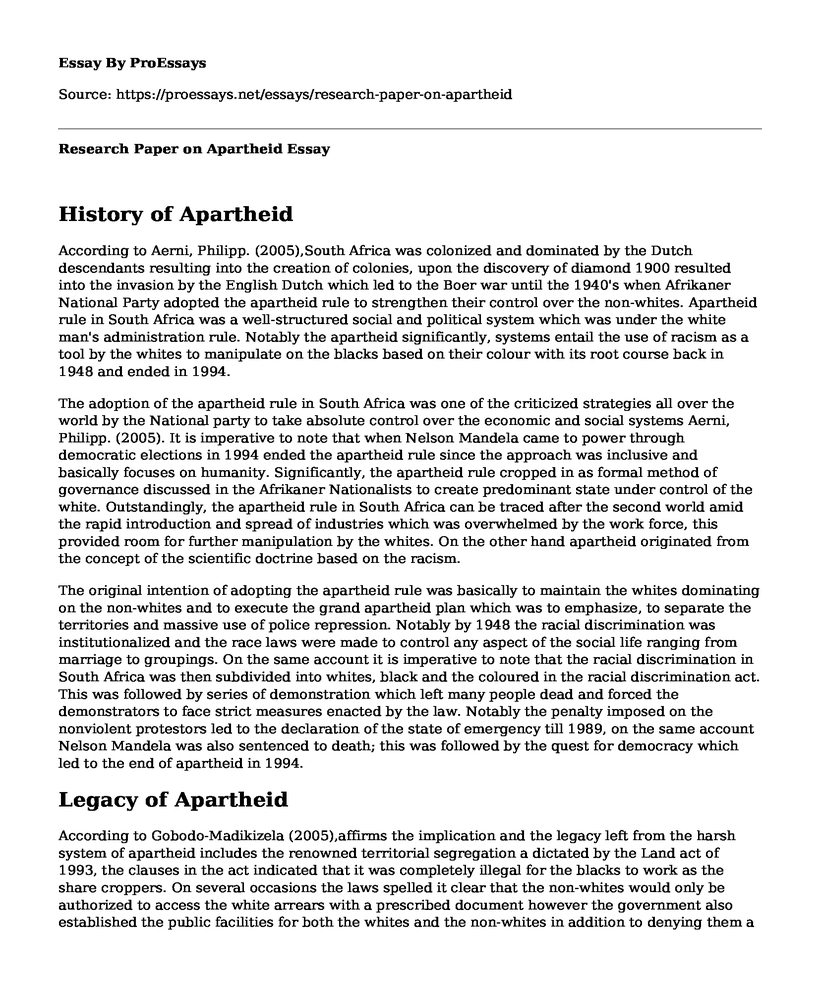History of Apartheid
According to Aerni, Philipp. (2005),South Africa was colonized and dominated by the Dutch descendants resulting into the creation of colonies, upon the discovery of diamond 1900 resulted into the invasion by the English Dutch which led to the Boer war until the 1940's when Afrikaner National Party adopted the apartheid rule to strengthen their control over the non-whites. Apartheid rule in South Africa was a well-structured social and political system which was under the white man's administration rule. Notably the apartheid significantly, systems entail the use of racism as a tool by the whites to manipulate on the blacks based on their colour with its root course back in 1948 and ended in 1994.
The adoption of the apartheid rule in South Africa was one of the criticized strategies all over the world by the National party to take absolute control over the economic and social systems Aerni, Philipp. (2005). It is imperative to note that when Nelson Mandela came to power through democratic elections in 1994 ended the apartheid rule since the approach was inclusive and basically focuses on humanity. Significantly, the apartheid rule cropped in as formal method of governance discussed in the Afrikaner Nationalists to create predominant state under control of the white. Outstandingly, the apartheid rule in South Africa can be traced after the second world amid the rapid introduction and spread of industries which was overwhelmed by the work force, this provided room for further manipulation by the whites. On the other hand apartheid originated from the concept of the scientific doctrine based on the racism.
The original intention of adopting the apartheid rule was basically to maintain the whites dominating on the non-whites and to execute the grand apartheid plan which was to emphasize, to separate the territories and massive use of police repression. Notably by 1948 the racial discrimination was institutionalized and the race laws were made to control any aspect of the social life ranging from marriage to groupings. On the same account it is imperative to note that the racial discrimination in South Africa was then subdivided into whites, black and the coloured in the racial discrimination act. This was followed by series of demonstration which left many people dead and forced the demonstrators to face strict measures enacted by the law. Notably the penalty imposed on the nonviolent protestors led to the declaration of the state of emergency till 1989, on the same account Nelson Mandela was also sentenced to death; this was followed by the quest for democracy which led to the end of apartheid in 1994.
Legacy of Apartheid
According to Gobodo-Madikizela (2005),affirms the implication and the legacy left from the harsh system of apartheid includes the renowned territorial segregation a dictated by the Land act of 1993, the clauses in the act indicated that it was completely illegal for the blacks to work as the share croppers. On several occasions the laws spelled it clear that the non-whites would only be authorized to access the white arrears with a prescribed document however the government also established the public facilities for both the whites and the non-whites in addition to denying them a voice in the labor unions on the pertinent issues revolving around national interest. On the other hand the legacy on apartheid also entails treatment of development according to the races
Works Cited
Aerni, Philipp. "Stakeholder attitudes towards the risks and benefits of genetically modified crops in South Africa." Environmental Science & Policy 8.5 (2005): 464-476.
Gobodo-Madikizela, Pumla, and Chris Van der Merwe, eds. Memory, narrative and forgiveness: Perspectives on the unfinished journeys of the past. Cambridge Scholars Publishing, 2009.
Cite this page
Research Paper on Apartheid. (2022, May 16). Retrieved from https://proessays.net/essays/research-paper-on-apartheid
If you are the original author of this essay and no longer wish to have it published on the ProEssays website, please click below to request its removal:
- Paper Sample on American Indian Activism
- Marriage Therapy Assessment Paper Example
- Essay Sample on Racial Ethnic and Identity
- Analysis of Speeches on Contemporary Society and Technologies
- Paper Example on Gender Roles in American Society: A Preconceived Notion
- Essay Sample on YWCA NYC: 150+ Years of Activism Empowering Women
- Essay Example on Healing Racial Trauma: Kenneth V.H. on Hidden Wounds







